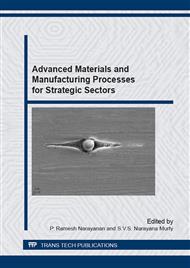p.195
p.199
p.203
p.207
p.211
p.215
p.219
p.223
p.227
Thermo Mechanical Fatigue Testing of GTD 111 Superalloy for Use in Gas Turbine Blades
Abstract:
Design of Turbo machinery is complex and efficiency is directly related to material performance, material selection is of prime importance. Temperature limitations are the most crucial limiting factors to gas turbine efficiencies. This paper presents the life of GTD 111 applied to gas turbine blade based on LCF and TMF test results. The LCF tests were conducted under various strain ranges based on gas turbine operating conditions. In addition, IP (in-phase) and OP (out of-phase) TMF tests were conducted under various strain ranges. The paper will focus light on above issues and each plays an important role within the Gas Turbine Material literature and ultimately influences on planning and development practices. It is expected that this comprehensive contribution will be very beneficial to everyone involved or interested in Gas Turbines.
Info:
Periodical:
Pages:
211-214
Citation:
Online since:
September 2015
Authors:
Price:
Сopyright:
© 2015 Trans Tech Publications Ltd. All Rights Reserved
Share:
Citation:


